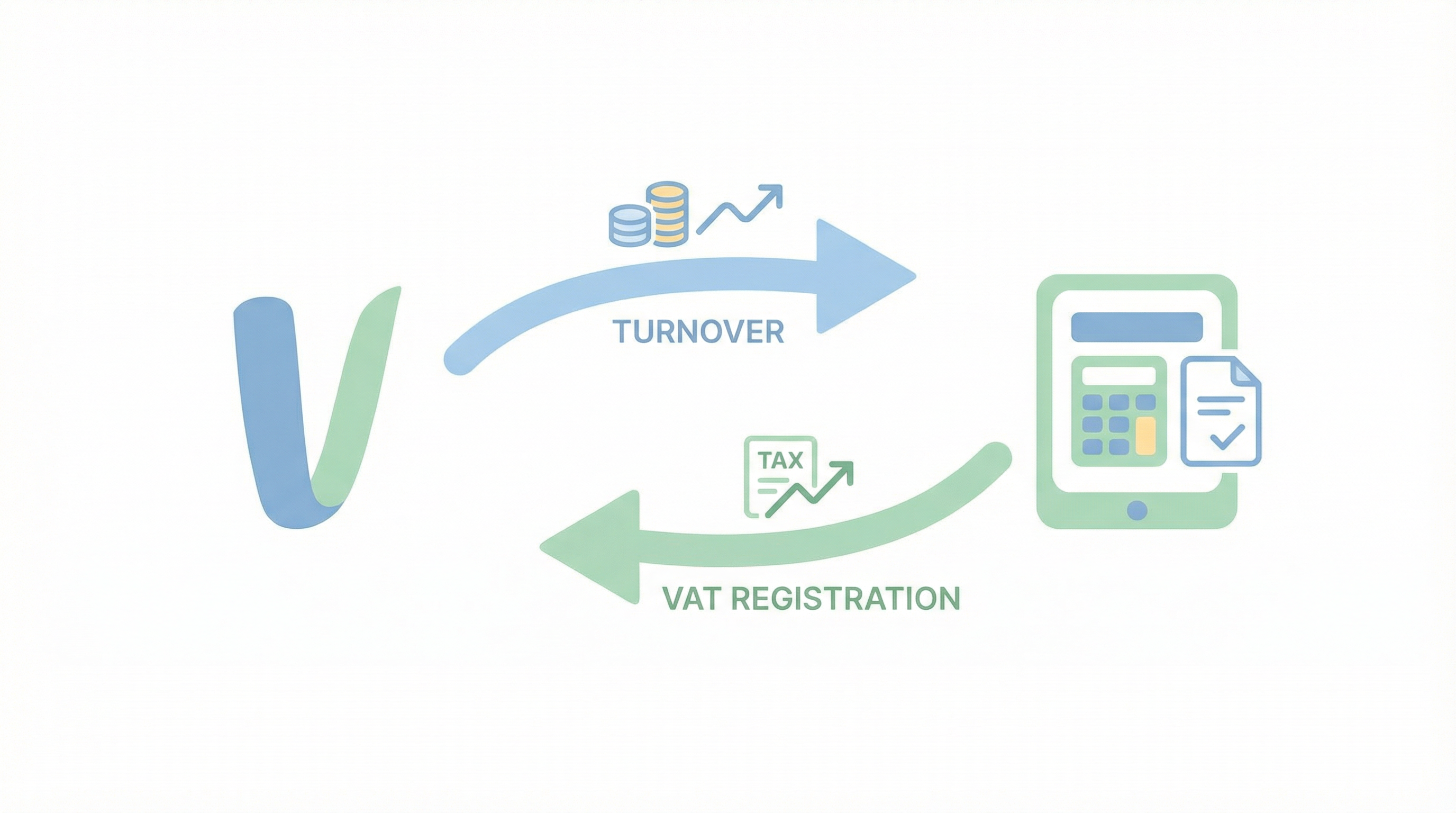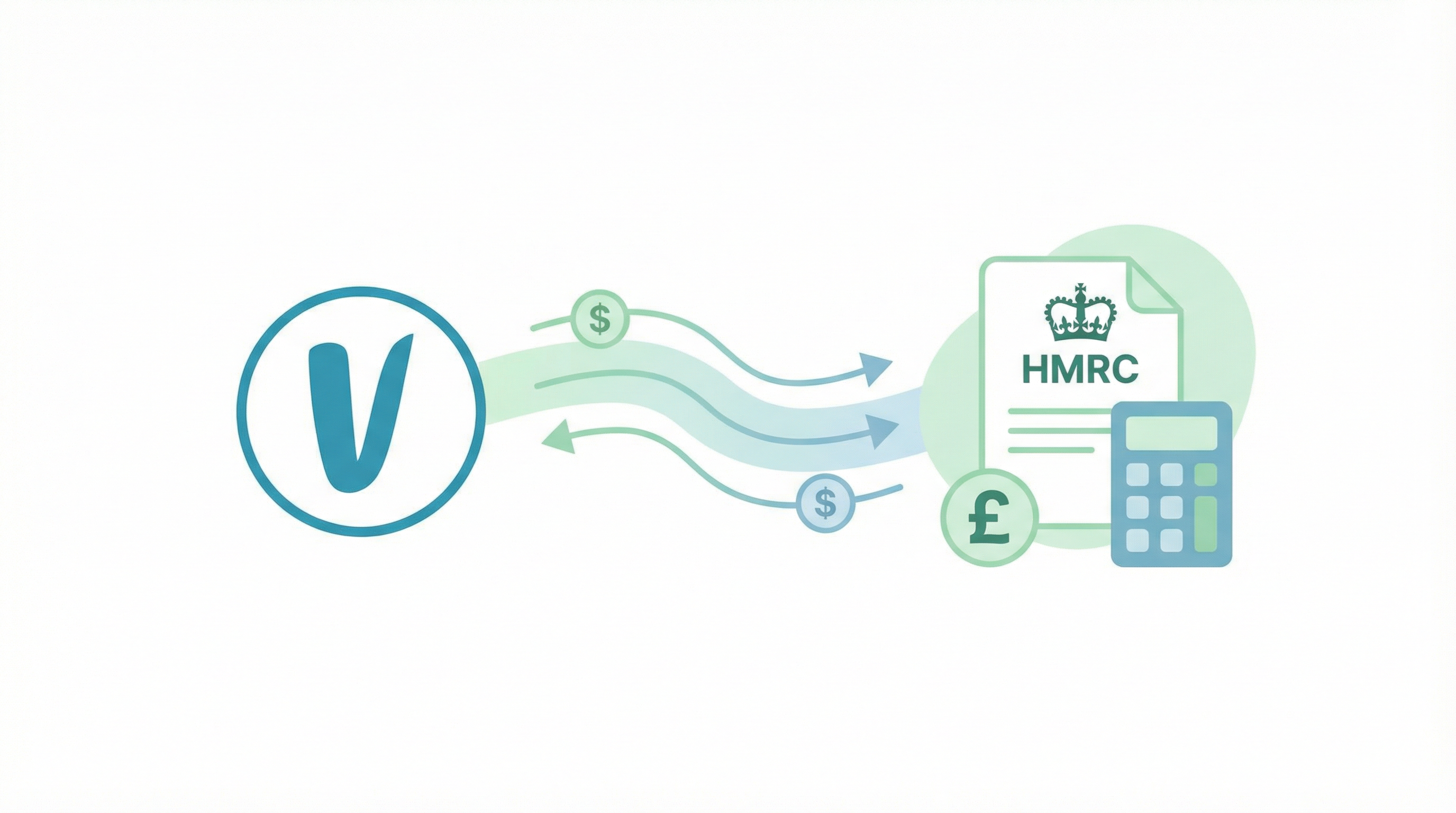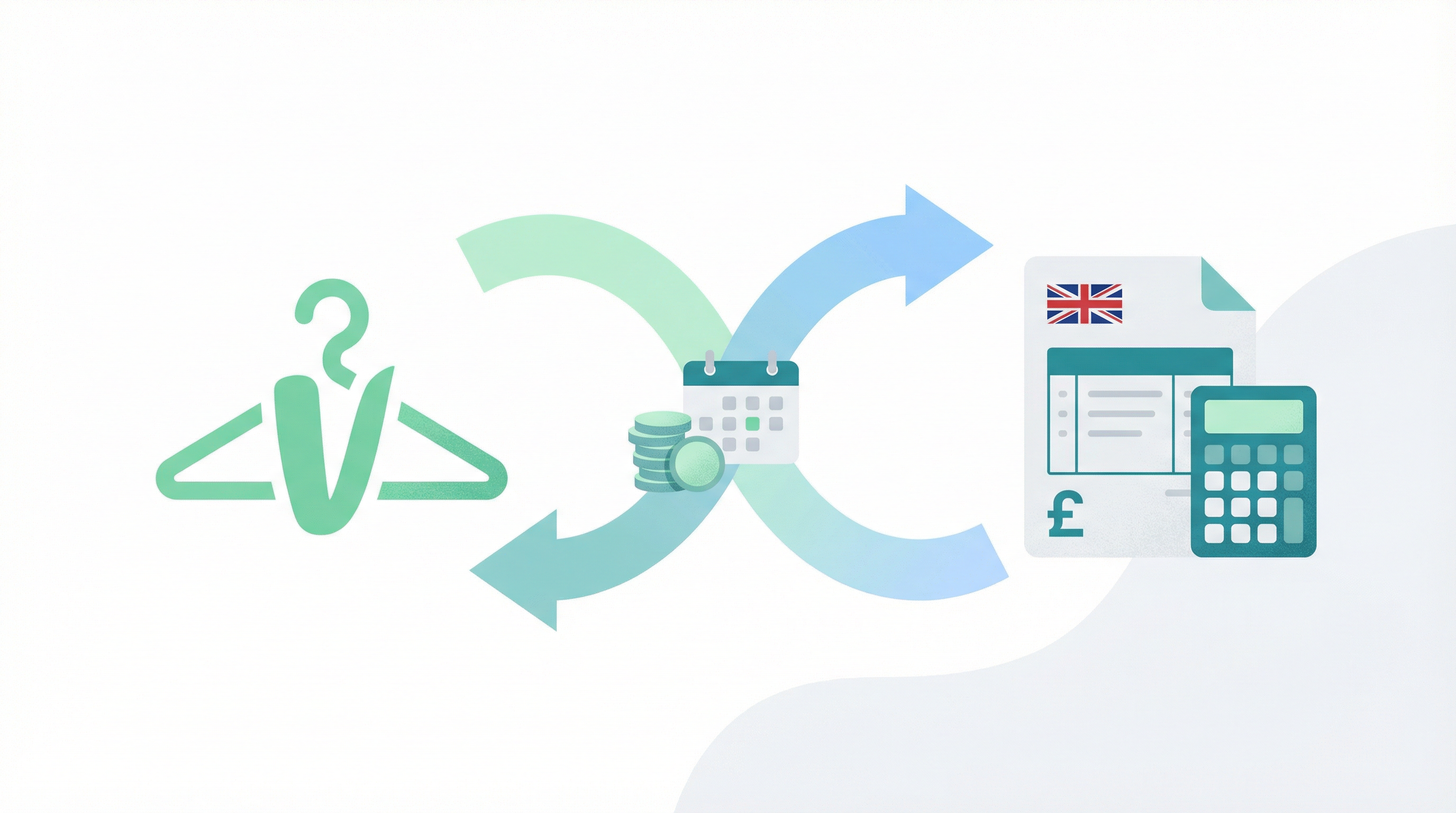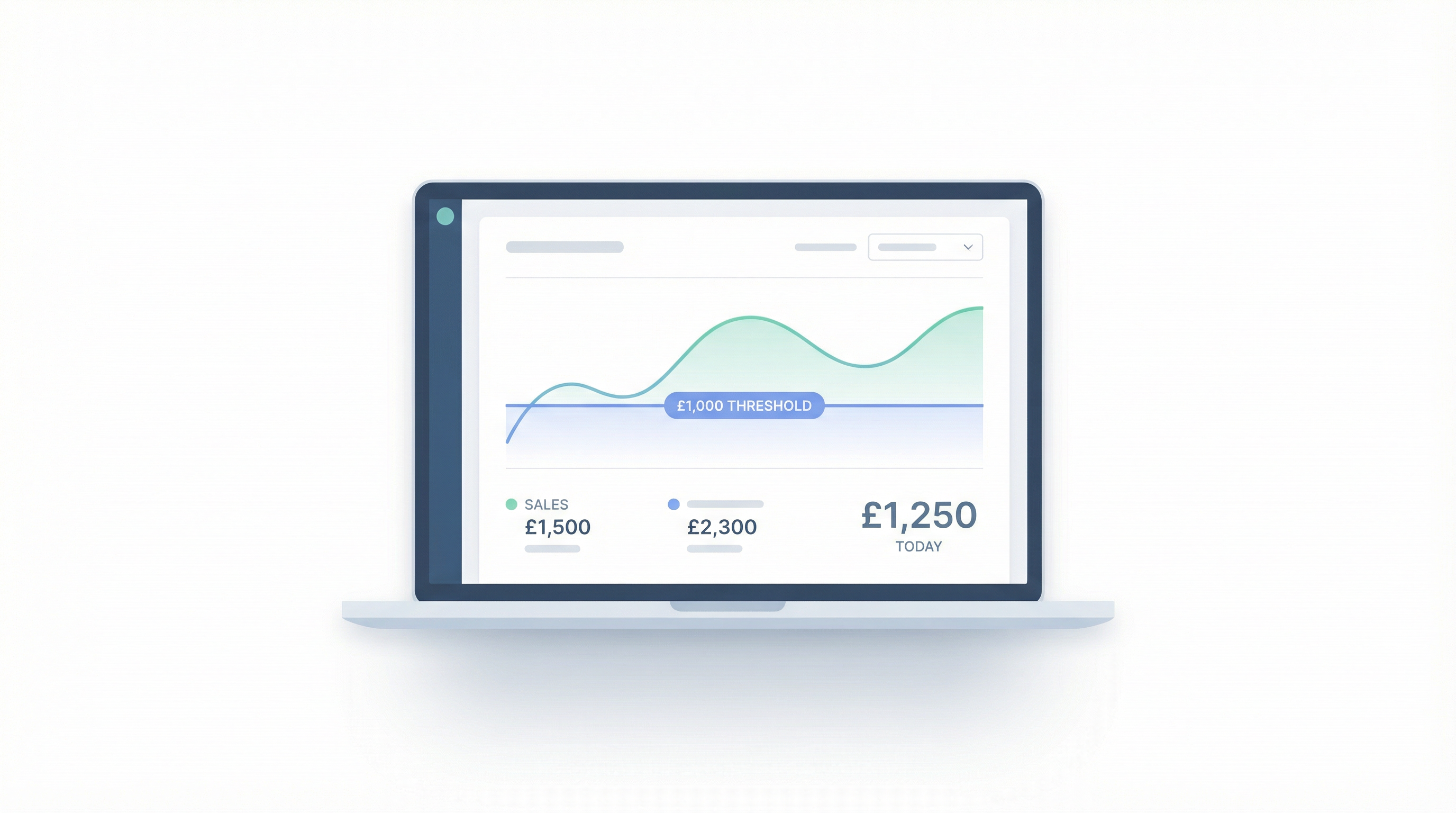UK VAT and Vinted Sales: When Do You Need to Register? (2024/25 Update)
Legal Notice: Vinta.app is independent and not affiliated with Vinted; Vinted has not reviewed or approved this content; this material is for information only and does not constitute legal, tax, or accounting advice.

UK VAT and Vinted Sales: When Do You Need to Register? (2024/25 Update)
For many Vinted sellers in the UK, Value Added Tax (VAT) might seem like a distant concern, more relevant to larger businesses. However, as your Vinted venture grows alongside any other business activities you might have, understanding when VAT becomes a legal requirement is crucial.
This guide explains what VAT is, the current UK registration threshold (which has recently changed), and what it means for Vinted sellers.
What is VAT (Value Added Tax)?
VAT is a tax charged on most goods and services sold by VAT-registered businesses in the UK. When a business is VAT-registered, it acts as a tax collector for HM Revenue & Customs (HMRC). The standard rate of VAT in the UK is currently 20% for most goods and services.
When Does VAT Concern Vinted Sellers?
VAT primarily becomes a concern for Vinted sellers when their total taxable turnover from all their business activities (not just sales on Vinted) approaches or exceeds the UK's VAT registration threshold.
Most casual or small-scale Vinted sellers decluttering their wardrobes or with modest side-hustle income will likely be well below this threshold. However, for those whose online selling businesses are expanding significantly, VAT is a key consideration.
The VAT Registration Threshold (Important 2024 Update)
The rules for VAT registration are based on your taxable turnover.
- Current Threshold: Effective from 1st April 2024, the VAT registration threshold in the UK increased to £90,000.
- Taxable Turnover: This is the total value of everything your business sells that isn't exempt from VAT or outside the scope of VAT. For most Vinted sellers operating as a business, this will be their total sales revenue from the items they sell. It's based on your revenue, not your profit.
- Rolling 12-Month Period: This is crucial. The £90,000 threshold is not assessed over a fixed calendar year or tax year. Instead, you need to continuously monitor your taxable turnover over any rolling 12-month period.
- You must register for VAT if your total VAT taxable turnover for the last 12 months was over £90,000.
- You also must register if you expect your total VAT taxable turnover to go over £90,000 in the next 30 days alone.
What Happens if You Exceed the VAT Threshold?
If your taxable turnover crosses the £90,000 threshold, VAT registration becomes mandatory. Here's what that involves:
- Register for VAT with HMRC: You must register for VAT within 30 days of the end of the month in which you exceeded the threshold. If you anticipate exceeding it in the next 30 days, you must register by the end of that 30-day period.
- Charge VAT on Sales: Once VAT registered, you must charge VAT (usually at the standard rate of 20%) on all your taxable sales in the UK, including those on Vinted. This means the price your customers pay will effectively increase if they are not VAT registered themselves.
- Issue VAT Invoices: You'll need to provide VAT invoices to any VAT-registered customers.
- Reclaim Input VAT: A key benefit is that you can generally reclaim the VAT you've paid on your business purchases and expenses (known as input tax).
- Submit VAT Returns: You'll need to complete and submit VAT returns to HMRC, usually every three months. Your VAT return will show the VAT you've charged on sales (output tax) and the VAT you've paid on purchases (input tax). You'll pay the difference to HMRC or claim a refund if you've paid out more VAT than you've charged.
- Keep VAT Records: HMRC requires specific VAT records to be kept, including a VAT account, copies of all VAT invoices issued and received. Making Tax Digital (MTD) for VAT rules also mean you must keep digital VAT records and submit returns using compatible software.
What if You Are Below the £90,000 Threshold?
If your taxable turnover is below £90,000:
- You do not need to register for VAT.
- You cannot charge VAT on your sales.
- You cannot reclaim any VAT you pay on your business expenses.
Voluntary VAT Registration
It's possible to register for VAT voluntarily even if your turnover is below £90,000. Businesses might do this if:
- They want to reclaim VAT on significant business expenses or start-up costs.
- They mainly sell to other VAT-registered businesses (who can reclaim the VAT charged).
- They believe being VAT-registered enhances their business's professional image.
However, for Vinted sellers whose customers are primarily private individuals (who cannot reclaim VAT), voluntarily registering and adding 20% VAT to prices can make them less competitive compared to non-VAT-registered sellers.
VAT and Second-Hand Goods on Vinted: The Margin Scheme
This is a particularly important consideration for many Vinted sellers. If you become VAT-registered and you buy and sell eligible second-hand goods, there's a special scheme called the VAT Margin Scheme.
- How it works: Instead of accounting for VAT on the full selling price of an eligible second-hand item, you account for VAT only on your profit margin (the difference between what you paid for the item and what you sold it for). The VAT payable on the margin is calculated at 1/6th (16.67%) of the margin.
- Benefit: This scheme is designed to avoid "double taxation" on items where VAT was likely paid when the item was first sold new. It can significantly reduce the VAT payable on sales of second-hand goods.
- Important Note: The VAT Margin Scheme has specific conditions and very strict record-keeping requirements (e.g., a detailed stock book). If you become VAT registered and deal in second-hand goods, it is essential to seek professional advice from an accountant experienced in this scheme. Incorrect application can lead to significant errors and potential penalties.
How Vinta.app Can Help Monitor Your Turnover
While Vinta.app doesn't handle VAT calculations directly, it plays a crucial role in helping you monitor your financial position:
- Accurate Sales Tracking: Vinta.app provides a clear and precise record of your gross sales income from Vinted.
- Monitor Your Approach to the Threshold: By regularly checking your Vinted sales turnover via Vinta.app and combining it with turnover from any other business activities, you can see if you are approaching the £90,000 VAT registration threshold and take timely action if needed.
Conclusion: Stay Vigilant as Your Vinted Business Grows
For most Vinted sellers, VAT is not an immediate concern. However, if your online business is thriving and your total taxable turnover is climbing towards the £90,000 threshold (over a rolling 12-month period), you must be prepared to register for and manage VAT.
Proactive monitoring of your turnover is key. If you are nearing the threshold, or if you become VAT registered and are selling second-hand goods, seeking professional advice from an accountant is strongly recommended to ensure you comply with all HMRC requirements.
Disclaimer: This article provides general information about UK VAT and is not a substitute for professional tax advice. VAT rules can be complex and are subject to change. Always refer to official HMRC guidance or consult with a qualified accountant or tax advisor for advice tailored to your specific business circumstances.
Keep a clear eye on your Vinted sales turnover with Vinta.app.
➡️ Sign up for Vinta.app to streamline your Vinted financial tracking today!
Tags

George Jefferson
Vinted Pro Seller and founder of Vinta.app, sharing expert insights on professional Vinted selling, tax compliance, and scaling your online business.


